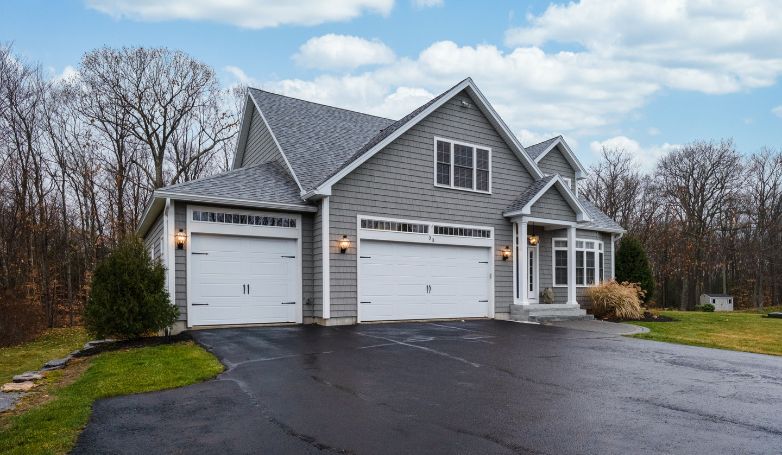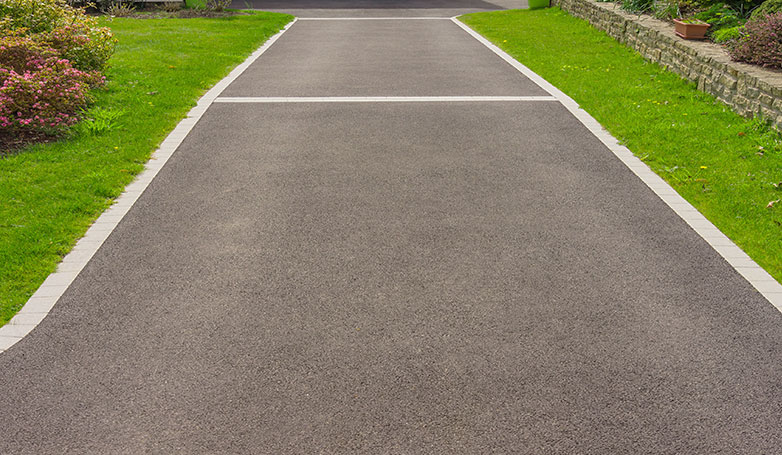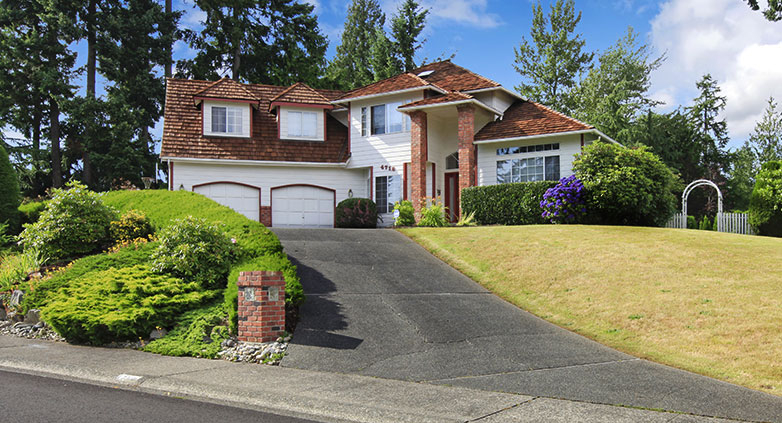How Steep Can a Paved Driveway Be? Limits & Solutions
Exploring the world of driveway slopes is crucial for both safety and functionality. In this insightful guide, we delve into the key question: How steep can a paved driveway be? Understanding the limitations and optimal design strategies is essential for homeowners and contractors alike.
The maximum recommended slope for a paved driveway is typically around 15%. Beyond this, safety and accessibility issues arise, particularly in adverse weather conditions. Steeper slopes, up to 20%, might be manageable with special considerations like textured surfaces or additional drainage solutions. However, local regulations and the specific vehicle types used should always be considered, as they can influence the practicality and legality of steeper driveway designs.
When designing a driveway, it’s crucial to balance the slope with the property’s topography and usage needs. Key considerations include the driveway material, local climate, and intended vehicle traffic. Expert advice is invaluable in achieving a driveway that is both functional and compliant with local building codes. Dive deeper into our comprehensive guide for more insights on achieving the perfect balance in driveway slope and design.
How Steep Can a Paved Driveway Be?

As homeowners embark on the journey of paving their driveways, the question of incline becomes a pivotal consideration. In this exploration, we delve into the nuances of driveway slopes, from navigating building code requirements to addressing the challenges posed by steep slopes and discovering custom solutions for unique approaches.
Paving Limits and Slopes
It’s commonplace for most experienced and reputable paving contractors to easily pave driveways’ with a 12%-15% slope. In extreme circumstances, with the proper architect\design firm, you may be able to find a very skilled company to pave up to a 25% angle which translates to 25 feet of rise over 100 feet of driveway. Anything over 25% will have to be surfaced with some other material than asphalt.
Navigating Building Code Requirements
According to the American Concrete Pavement Association, if your driveway’s angle is over 15%, it’s important that you are talking with a reputable company; one that knows the ”in’s and out’s” of your local building code requirements and who is knowledgeable in how to design and engineer a driveway that will survive the tests of time and nature.
Those driveway’s with 15% angle or more, require more complex designs, and in some cases, asphalt cannot be applied if the grade is too steep, due to the compactors not being able to safely and effectively operate. So make sure when you are searching for the right contractor, you verify some of their work; ensuring they have done similar jobs and the work has held up.
Challenges of Steep Slopes

Depending on where you live, once you have gone through all the proper steps and selected the right paving company, you should have a keen idea as to what your driveway approach will be like. If the slope is too steep to have a driveway directly to the home, it’s good to get several companies to bid on the job of designing and paving your driveway. Meeting with several different companies will give you a better picture of all the work that will be performed to get the driveway to your desired specifications.
A reputable paving contractor will have an engineer or design architect that they recommend, who can design the ideal driveway for your home, taking into account all the important factors, to have a job done right.
Custom Solutions for Steep Approaches
Depending on your budget, there are many different options you can choose to offset the grade of your driveway. If the approach is too steep in a straight line, many companies choose to design driveways that twist and curve up the hill, gradually. If your lot size is small and space is tight, there are several options.
- Digging into the hillside
- Add Turns and curves
- Transition Zone
- Transition Gradients
Types of Driveways to Consider for Steep Properties
Where you live in the world plays a big factor in what type of driveway installation you should get, period. Add the issue of a steep incline to your driveway, and you want to make sure that you are choosing the right product. You can either talk with contractors or such sites as the National Asphalt Pavement Association, and list other good materials to choose from, but below are the most popular materials.
Gravel

Gravel driveways present an affordable solution with easy traction and minimal maintenance. However, it demands periodic re-grading and gravel replacement as it naturally wears and washes down the hill. The simplicity of upkeep makes gravel a practical choice, offering homeowners an economical yet functional option for their steep inclines.
Moreover, gravel’s permeability allows for efficient water drainage, reducing the risk of erosion and water buildup. Despite being a cost-effective choice, regular maintenance and attention to grading are necessary to ensure the longevity and performance of gravel driveways on steep terrains.
Resin
While resin driveways come with a higher upfront cost, they stand out as an excellent alternative for steep slopes. Particularly beneficial for areas requiring extra drainage, resin driveways are permeable, preventing water accumulation. Remarkably, in certain locales, resin driveway installations may not require permits, streamlining the process and offering an environmentally conscious option for those environmentally-minded homeowners.
Additionally, resin driveways boast a unique aesthetic appeal, providing homeowners with a customizable and visually pleasing solution. The initial investment in a resin driveway pays off in terms of durability and the ability to navigate challenging terrains, making it a worthy consideration for those prioritizing longevity and eco-friendliness.
Concrete
Opting for concrete for your steep driveway entails a higher initial investment but offers unmatched long-term durability, surpassing that of asphalt. Its robust nature and extended lifespan make it a cost-effective choice over time. Even in areas too steep for conventional paving equipment, concrete pump trucks can navigate difficult terrain, ensuring a solid and enduring installation.
Moreover, concrete driveways provide homeowners with a versatile canvas for various finishes and designs. Stamped patterns, coloring options, and textured surfaces enhance the visual appeal of the driveway, allowing for a customized and aesthetically pleasing addition to the property.
Asphalt

Asphalt remains the most common, cost-efficient, and long-lasting choice for driveways, especially on steep inclines. Particularly effective at combatting winter weather, asphalt is easier to keep clear of ice and snow compared to concrete. While it is less expensive than concrete initially, proper installation is key to minimizing maintenance costs over the driveway’s lifespan.
Additionally, advancements in asphalt technology, such as permeable asphalt options, address water runoff concerns, making it an environmentally conscious choice. Homeowners benefit from the ease of repair and resurfacing, ensuring that the driveway maintains its functionality and visual appeal over the years.
Navigating these options allows homeowners to align their priorities with the specific characteristics of each driveway type, ensuring a functional and visually appealing solution for their steep property that stands the test of time.
Things to Consider Before Paving A Steep Driveway
Before starting the job, make sure that you have thought long and hard about the task at hand. It’s not a quick process if starting with a new driveway installation. You want to be happy with your ultimate decision, so make your time count. Here are some things to think about before paving your drive on the hill.
- Can you enter and leave the property in all weather conditions?
- Are you willing to perform and maintain the driveway of your choosing?
- Are you aware of all the long-term weather effects on the materials?
- Have you checked all local regulations and zoning/permitting laws?
- Will there be snow and ice? If so, what is your removal and clearing plan for the winter?
- Will you be able to wait the proper cure and set times before using the driveway?
- Is it aesthetic appealing?
Maintenance Tips for Your Driveway

Having a driveway that has a steep incline offers several challenges and weather is definitely a common factor.
Rainwater, snow, and ice all need to be able to drain properly off of your driveway. If the drainage system is built incorrectly at the base of your steep driveway, any paving job you have done or driveway installation you get will be ruined, unless designed properly. It is just as important once you have decided how steep your driveway can be paved, to ensure that you keep up on the maintenance.
- Keeping snow, ice, and accumulating puddles of water off the surface will lengthen the life of your driveway. If you are not able to keep the snow and ice off yourself, hire a company to maintain your driveway.
- Talk with your paving contractor and know what you need to do for upkeep; re-sealing, filling cracks, grading and other preventative steps may be needed to prevent further cracking and damage.
- If a problem arises with your driveway, such as a pot-hole or cracking- do not wait for a long time before calling out someone to repair the problem. The longer you wait, the worse the issue becomes.
FAQs about How Steep Can a Paved Driveway Be

Delving into the intricacies of driveway inclines, let’s unravel common queries surrounding the steepness of paved driveways:
What is the maximum paving slope?
The maximum paving slope commonly recommended by experienced contractors ranges between 12% to 15%. However, in specific circumstances and with skilled architects, slopes of up to 25% can be paved effectively.
What is the maximum angle for a driveway?
The maximum angle for a driveway depends on various factors, including local regulations, geographical considerations, and soil stability. Generally, angles up to 15% are manageable, but beyond that, consulting with professionals becomes crucial.
Is a 14-degree slope steep?
A 14-degree slope is considered moderately steep and falls within the typical range for driveways. However, the perception of steepness can vary based on individual preferences and local standards.
Is 20% too steep for a driveway?
A 20% slope is considered relatively steep for a driveway. Beyond the standard recommendations, paving such inclines may require advanced engineering and construction techniques. Professional consultation is essential to ensure safety and functionality.
What is the steepest grade driveway can be?
The steepest grade a driveway can be depends on several factors, including local regulations, soil stability, and the expertise of the contractor. In extreme cases, driveways with slopes up to 25% have been successfully paved with the right design and construction methods. However, slopes exceeding this may require alternative surfacing materials. Consulting with professionals is vital to determine the feasibility of paving on steeper grades.
Conclusion
Many common problems occur when a driveway is installed improperly. When a driveway is installed improperly on a steep incline, not only do problems occur with the material itself, but it becomes very dangerous for the homeowner and their guests. If the incline gradient is too steep, at the base of the driveways’ entrance, vehicles can get damaged while entering the drive as well as upon leaving. Also, if there is snow or ice, it may be impossible for a car to get up the driveway, should the gradient be too steep. Or you may even get stuck in your garage, fearing your car may become a bob-sled when trying to leave out of your home
Adding in-climate weather conditions to this scenario and you have a recipe for disaster and liability; even walking up too steep of a drive can be perilous in the right conditions. Be smart, be cautious, and by choosing the proper design of driveway up to your home, you can rest easy that your steep driveway was paved properly.


